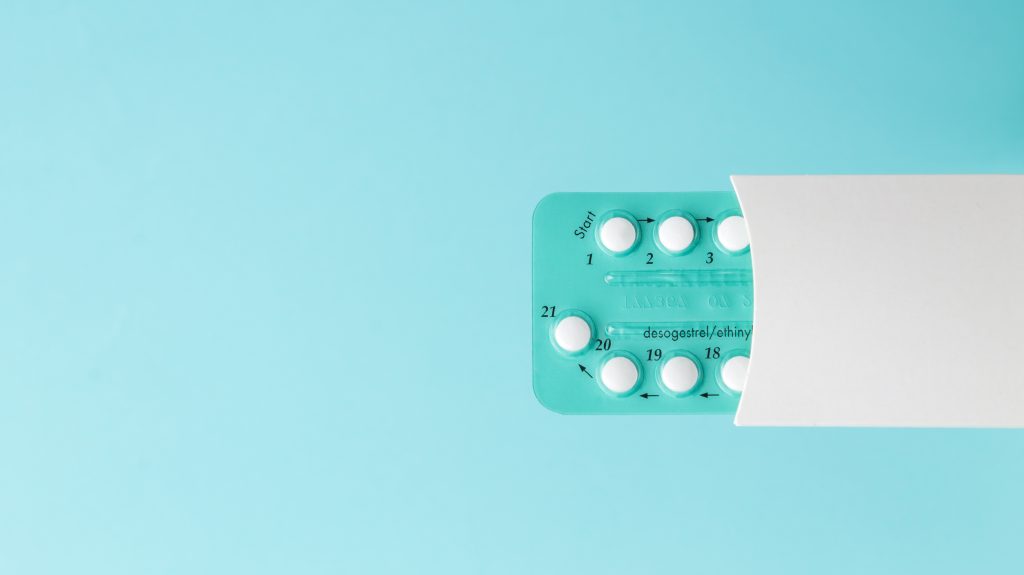Your Thyroid on The Birth Control Pill
January 25, 2019 By Sarah WhiteNo Comments

Your thyroid on the birth control pill: The connection between the birth control pill and hypothyroidism, what your doctor didn’t tell you about the pill.
I’ve treated hundreds of women with thyroid dysfunction and +95% of them have this 1 thing in common … they are on, or have been taking hormonal birth control for more than 5 years. This connection is personal to my health journey as well, which is why I have explored the topic thoroughly for my readers. After almost 10 years on the birth control pill I began feeling extremely fatigued, bloated, and gained almost 10lbs in a very short span of time despite a healthy diet and regular exercise routine. [Those of you who are already my patients know that I am a tiny little doc and 10lbs was A LOT on my small frame]. After a 2014 thyroid panel revealed suboptimal TSH & free T3 levels, I knew I had to get off the birth pill in order to regain my health.
Thyroid Health Basics – What you need to know:
Before we dive into the topic of the pill & your thyroid health I want to briefly overview the role of the thyroid gland and why it’s so important to your beauty, fertility and overall health. Research estimates that a whopping 1 in 3 people have thyroid disease yet more than half of those with a thyroid condition likely don’t know they have it – struggling with weight gain & fatigue for years before they are properly diagnosed. Women are especially vulnerable as they are 5 to 8 times more likely to have thyroid disease. If you suspect that you may have an under-functioning thyroid gland but your doctor keeps assuring you that all is well it may be because they are only testing your TSH, a brain signal – not a true thyroid hormone. Check out my post here on why a TSH-only based approach to thyroid testing is inadequate and outdated based on the current research, + here to learn about the top tests I recommend for my patients with suspected thyroid disease.
TSH is hormone messenger released by the pituitary gland in your brain. It tells your thyroid gland to make more thyroid hormones (T3 + T4). Your thyroid responds to this signal by secreting T4 and a small amount of T3. T4 is considered the ‘precursor’, or less active form of thyroid hormone. It travels to the other tissues in your body like the stomach, liver and kidneys where is is converted to active T3. This conversion is important because it’s the T3 hormone that is mostly responsible for your energy, mood and metabolism (including body temperature – if you’re the person at home or work that’s always cranking up the heat you likely have a low functioning thyroid & metabolism and absolutely NEED T3 levels checked along with TSH for a proper thyroid assessment). Unfortunately, stress, heavy metals, toxic chemicals / pesticides, nutrient deficiencies and medications all inhibit thyroid hormone conversion leaving you lethargic, unhappy and unable to shed that lingering 5lbs despite all of your best health efforts.

Your thyroid + the Pill – How the pill affects your thyroid function:
- It Increases SHBG: The most obvious way that the pill impacts your thyroid gland is through a protein called sex hormone-binding globulin (SHBG). The pill significantly elevates SHBG levels, which binds thyroid hormone making it unavailable for use in the body. This means that even if you don’t have any thyroid issues to begin with the pill can cause binding of thyroid hormone and put you in a hypothyroid state regardless of your natural thyroid output. Not only is optimal thyroid health critical to your energy, weight and mood but there also happens to be a thyroid receptor on EVERY SINGLE CELL in your body. There is even data showing that the pill can irreversibly increase SHBG levels, meaning you may always need a little bit of thyroid support post-OCP use in order to maintain optimal thyroid output. This is a very unfortunate long-term side effect of the pill and I believe that this risk should be explained to all women before they start taking it. Would I have taken the pill for 10+ years if my MD had told me that it could irrevocably change my hormone levels and thyroid health? Definitely NOT!
- The Pill Increases Inflammation: Women on the birth control pill were shown to have higher levels of inflammatory markers including CRP and fibrinogen. Studies indicate that increased levels of these inflammatory markers can have a negative impact on the thyroid gland. Inflammation has specifically been shown to induce a condition called Euthyroid Sick Syndrome (EST). This basically means your lab work can look very normal but you may still have symptoms of thyroid disease. The reason for this is because inflammation interferes with the conversion of T4 into metabolically active T3. It can also cause your body to make more of a hormone called reverse T3, or rT3. Reverse T3 is produced by the body due to increased stress and inflammation. Elevated rT3 will bind thyroid hormone receptors but instead of turning them on it will actually inactive them. A study published in the Endocrine Disorders medical journal followed 60 patients with thyroid disease and found that those with higher inflammatory markers had the lowest levels of metabolism-boosting T3. Your TSH can’t effectively distinguish between free T4, free T3 and rT3, so unless you run a full thyroid panel while on the OCP you will have no idea how well your thyroid is functioning due to the increased inflammation induced by the pill.
- Nutrient Depletion: The Birth Control Pills depletes nutrients required for optimal thyroid health which can lead to long term consequences for the thyroid gland. Firstly, the pill significantly depletes B vitamin levels, including B6, folate and B12. These vitamins are essential in the synthesis and use of thyroid hormone in your body. This medication-induced deficiency is well documented and every single woman prescribed the OCP by their medical doctor should also be given a high-quality B complex. The pill can also deplete levels of zinc and selenium which are absolutely critical to thyroid hormone production and binding. Selenium is needed for thyroid hormone production and to convert T4 to the active T3. It’s also been well studied in preventing autoimmune thyroid disease. Zinc, on the other hand, is required for thyroid receptor binding. This means that even if your thyroid is making enough hormones a zinc deficiency induced by the pill can make it difficult for these hormones to bind to cells in the body.

Let me be clear, I am not “anti-birth control”. Some women experience very few side effects and it can be an inexpensive and effective way to prevent unwanted pregnancy. I do, however, have a problem with the lack of informed consent expressed to patients prior to starting the pill. The pill has well documented effects on a woman’s nutritional status, thyroid health and mood, and it in no way helps to “balance” a women’s hormonal cycle. If you have been on the pill for over 5 years and are beginning to experience symptoms of depression, weight-gain and fatigue it is definitely time to take a look at your thyroid and nutrient levels. I encourage you to speak to your Naturopathic doctor or MD and requesting a full thyroid panel and possibly discuss alternative birth-control methods.
If you live in the GTA and want to explore your thyroid health on the OCP you’re welcome to book in for an initial in-person consultation or contact me via my website for additional information.
If you’d like to work together and you’re not a resident of Ontario*, or you’d prefer an online consultation you can book online with Dr. Sarah here.
References:
https://www.ncbi.nlm.nih.gov/pubmed/22484490
https://www.ncbi.nlm.nih.gov/pubmed/16409223
https://www.sciencedirect.com/science/article/pii/S153718910200304X
http://www.ncbi.nlm.nih.gov/pubmed/?term=21540553
http://www.ncbi.nlm.nih.gov/pubmed/?term=9781636
https://www.ncbi.nlm.nih.gov/pubmed/23852908
https://www.ncbi.nlm.nih.gov/pubmed/21967158
https://www.ncbi.nlm.nih.gov/pubmed/28315909
https://www.ncbi.nlm.nih.gov/pubmed/70377
https://www.ncbi.nlm.nih.gov/pmc/articles/PMC3798926/
COMMENTS
Leave a Reply
This site uses Akismet to reduce spam. Learn how your comment data is processed.
Mauren Meneses says
MAY 13, 2021 AT 8:15 AM
Hormonal issues and nutritional help
Reply